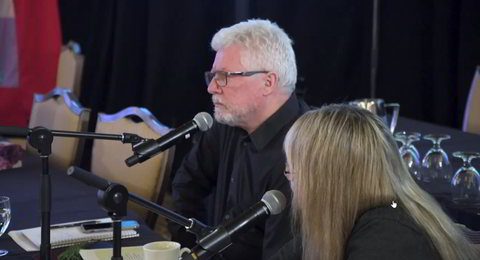Focus: Dr. Allan Wade
Focus: Dr. Allan Wade
Focus: Dr. Allan Wade
Dr. Allan Wade, C.M., has been appointed as a Member of the Order of Canada
Victoria, B.C. – Dr. Allan Wade, C.M., has been appointed as a Member of the Order of Canada – one of the country’s highest civilian honours – in recognition of his work in developing Response-Based Practice, a specialized approach to addressing violence.
Response-Based Practice evolved from a method of therapy to a framework for improving institutional responses in law enforcement, criminal justice, family law, therapy, child protection, refuges/shelters, victim/survivor and offender treatment, research, and education.
“Thanks to meeting some extraordinary people – colleagues and clients – I became interested in how people respond to and resist violence, directly and indirectly” said Dr. Wade. “Careful exploration of such responses contests the blaming and pathologizing of victims/survivors, reveals the controlled and deliberate nature of violence, and provides a more reliable basis for working with people who have used violence.”
From the outset, Dr. Wade and his Canadian colleagues worked with diverse communities in Canada and abroad – collaborations that were furthered through the Centre for Response-Based Practice, which organized the Dignity Conference series and continues to offer ongoing training for professionals around the world.
The reach of the approach has been illustrated in a number of ways, notably:
- National Inquiry into Missing and Murdered Indigenous Women and Girls and LGBT2SI+ Persons: Dr. Wade testified at the request of the Liard Aboriginal Women’s Society, where he spoke about the power of language and the necessity of honouring the ongoing resistance of Kaska and other Indigenous peoples to colonialism, past and present.
- Stockholm Syndrome: Through conversation with Kristin Enmark, the first person said to have Stockholm Syndrome, Dr. Wade showed that the notion of Stockholm Syndrome – the illusion that became fact – was used to suppress criticism of authorities and conceal the determined and courageous responses of the hostages.
- Youth for Dignity: Developed by the Liard Aboriginal Women’s Society (LAWS) and based in Watson Lake, Yukon, Youth for Dignity promotes inclusion, community safety, and violence prevention through culturally-based activities led by Kaska women elders and facilitators who work to address all forms of violence in the colonial context.
Dr. Wade’s appointment as a Member of the Order of Canada acknowledges the core principles of Response-Based Practice as a means of upholding the dignity of diverse individuals and communities.
“Allan, and the ideas behind Response-Based Practice, have irrevocably changed the lives of individuals who experience violence, professionals who have the privilege to join this field and stay in it, organizations with leaders who aim to uphold the dignity of all people, and communities whose members are striving to increase safety,” said Dr. Shelly Dean, RCC, AAMFT, who initiated the nomination Dr. Wade for the Order of Canada and remains one of his closest colleagues.
Established in 1967, the Order of Canada has recognized more than 7,600 individuals that have been honoured for inspiring innovation, shaping who we are and enriching Canada’s fabric.
On Violence, Resistance, and Power in Language
At a conference in Sweden, Dr. Allan Wade discusses social responses; particularly, he touches on how a person who has been abused may be further traumatized by the social responses received from people who one perceives as sources of support. Allan discusses how absent positive social responses and the language used to talk about assault can impact the victim in negative ways.
The Story of Charlene
In this clip, Dr. Allan Wade tells the story of a Vancouver Island woman who was taken away as a young girl by “Indian Agents”–colonial agents sent to remove Indigenous children from their families and culture.
He retells their story and therapeutic work together, honouring Charlene’s resistance to colonial power. At the same time, Allan describes how the impacts of being in a prison camp can linger for decades, influencing one’s actions in the present.
Honouring Resistance
In this clip from a counselor-training DVD we see how the response-based approach to therapy exposes violence, clarifies the perpetrator’s responsibility, elucidates and honours the victim’s resistance, and contests the blaming and pathologizing of victims.



